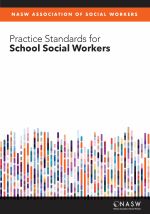Recent Titles

The go-to guide for social workers, counselors, and mental health professionals in primary and secondary education, this book provides real-world resources that social workers can implement on the first day of school and beyond, featuring hands-on activities that are easily reproducible, templates and forms to reduce paperwork time, and thoughtful advice to help school social workers excel at their job.
Included are detailed instruction on how to conduct individual counseling, run small groups, and implement schoolwide programs that meet students where they are and address crises head on. Issue-specific groups are discussed, including those for grief and loss, anger management, bullying intervention, healthy masculinity, and healthy relationships.
Fundamentally, the book strives to empower school social workers to create a safe and healthy environment for everyone at school and to support students in getting the most out of their education.

This book is the ultimate resource for social workers and agencies concerned with staff safety. Using an ecological approach, Christina E. Newhill provides strategies for predicting violence, establishing a rapport with aggressive and violent clients, and treating violent clients through various interventions.
With social worker safety in mind, this unique guide offers procedures for assessing risk in practice settings; enhancing environmental safety; and developing safety policies and plans for office, home, and community visits. When violence does occur, the author provides self-defense strategies that do not require specialized training but can reduce the risk of physical harm. The book also addresses the psychological and emotional impact of experiencing violence, including primary and secondary traumatic stress reactions, the stages of trauma resolution, and the important role of professional self-care in maintaining well-being and preventing burnout. This concise how-to guide can be kept in the office for easy reference or stored in the car to brush up on safety skills before home visits.

The use of artificial intelligence (AI) is growing in the field of behavioral health in clinical, administrative, advocacy, policy, and educational settings. Alongside these advances, the use of AI ushers in a new era of ethical issues and risk management threats, posing many challenges. Rather than being overwhelmed by these fast-moving developments, this book invites you to be informed. A foremost expert in ethics, Reamer uses real-world examples and dozens of case studies to provide insights into the ways in which behavioral health professionals are using AI, the associated ethical and risk management issues, protocols for ethical use of AI, and state-of-the-art strategies that will protect clients and practitioners alike.
Whether you enthusiastically embrace AI or are wary of its dangers, this technology is here to stay. As with any cutting-edge innovation, it will take time to fully comprehend both its opportunities and its pitfalls. You can be an active participant in these ongoing efforts and dialogues and be cognizant of the impact of AI on practice. After all, awareness and participation are at the center of what ethical practice requires.

This book serves as an innovative resource for directors of field education, faculty liaisons, field instructors, task supervisors, and other professionals whose responsibilities are to prepare students for their roles after graduation. Throughout, real-world experiences and case studies offer insight into expanding the online educational environment, using a trauma-informed approach to field education, and increasing international placements and partnerships. Further, as both students and field instructors are at high risk of burnout, the authors provide strategies for self-care, mindfulness, and achieving work–school–life balance.
The authors provide concrete guidelines and activities for field educators that will enhance their knowledge of various forms of accessibility, including recruitment, orientation, and field seminar, with the goal of creating an environment where all students can flourish. In a rapidly changing profession that requires more advanced skill sets to satisfy performance expectations by social work agencies, this book aims to inspire a recalibration of field education roles to ensure all students receive a worldclass field experience.

The 13th edition of Social Work Speaks is a comprehensive and unabridged collection of policies, including those adopted and revised by the NASW Delegate Assembly in 2024. The policy statements set the parameters for NASW’s positions and actions on a broad range of public policy and professional issues.
Social Work Speaks is a reference tool that represents the collective thinking of thousands of social workers across all fields of practice. This user-friendly resource can assist in developing organizational responses to policy issues, conducting policy analysis, and working in advocacy coalitions. The 13th edition includes updated policy statements on a wide range of topics, including affirmative action, electoral politics, end-of-life decision making, healthcare, LGBTQIA2S+ issues, social justice, and youth suicide.

Reflecting
the ethics and values of the social work profession, the National Association
of Social Workers’
Practice Standards for School Social Workers
addresses the changing landscape of schools and the current practice trends of
school social workers. The guiding principles and 15 standards for professional
practice cover, among other topics, school safety, technology, cultural
competence, and emergency and disaster preparedness and response. The school
practice standards are a helpful guide for all social workers who work in
school settings. Additional information is at
https://www.socialworkers.org/Practice/School-Social-Work.

Going beyond clichéd self-help advice, Self-Care in Social Work applies a cognitive coping framework to social work activities to support practitioners in preventing or reducing burnout, secondary trauma, and vicarious trauma. This framework is woven into chapters devoted to self-awareness, self-regulation, and self-efficacy, applying social work skills to the practitioners themselves.
Now in its second edition, the book includes current research on the impact of stress, burnout, secondary trauma, and vicarious trauma. Self-compassion is presented as a tool for self-regulation, alongside material on cognitive reframes, mindfulness, and balanced use of empathy. Finally, this edition features a new chapter focused on traumatic stress related to racism and oppression, with contributions from experts on culturally relevant approaches to self-care. For social workers, counselors, and mental health professionals who struggle with exhaustion and are at risk for burnout, Self-Care in Social Work provides insight, inspiration, and hope.

This collection of 80 real-world-based clinical vignettes offers a diverse range of clinical counseling cases, covering all the major DSM-5-TR diagnostic categories, to help you build familiarity with the major DSM-5-TR diagnoses and the wide variety of cases that may be found in exam questions, licensing tests, or your social work practice. For each case, the answer key provides possible risk factors, diversity considerations, ethical and legal concerns, treatment issues, and possible diagnoses.
Whether you are a social work student, aspiring counselor, or practicing clinician, this book will help you increase your diagnostic skills and ability to recognize risk factors in the classroom, on tests and licensing exams, and in the field.

First published in 2009, The Social Work Ethics Casebook was the first ethics casebook, including extensive cases and commentary, written exclusively for social workers. The second edition
was published in 2018. This
revised second edition reflects changes made in the 2021 Code of Ethics of the National Association of Social Workers and includes discussion of new and updated
ethics standards, especially pertaining to cultural competence and practitioner self-care.
This book draws attention to ethical issues related to confidentiality and privacy, informed consent, client self-determination, professional paternalism, boundary issues and dual relationships,
conflicts of interest, cultural competence and diversity, use of technology, termination of services, administration, practitioner impairment, commitments to employers, social work education
and training, and more.

Designed to help practitioners build writing skills in a variety of settings, Social Work Documentation is a how-to guide for social work students and practitioners interested in improving their record keeping and documentation skills. This wildly popular, must-have resource provides practical advice on current practice issues such as electronic case recording, trauma-informed documentation, and assessing and documenting client cultural differences of relevance.
The third edition has been updated to view documentation through person-first language, and includes a new chapter on bias-free language selection, with examples and exercises to ensure appropriate wording choices are used related to age, disability, immigration and socioeconomic status, and gender and sexual orientation.

Ethical Standards in Social Work is a practical guide designed to help social workers protect clients, make sound ethical decisions, and minimize the risk of professional malpractice and disciplinary action. The revised third edition reflects the 2021 updates of the Code of Ethics of the National Association of Social Workers, which provides social workers with a comprehensive summary and analysis of ethical standards in the profession and an explicit statement of the profession’s principal mission and core values. Ethical Standards in Social Work now includes extensive discussion of new and updated ethics standards, especially pertaining to cultural competence and social workers’ self-care.

Using firsthand accounts from 200 Black adolescents, Black Male Youth Raised in Public Systems: Engagement, Healing, Hope validates the fears, anxieties, and complexities of these youth. The authors point to the need for adults to “get out of the way” so they are better positioned to obtain access to understanding how these youth consider their life journeys and under what terms they allow a relationship with an adult, which is critical and necessary for their healing.
Specifically, the book presents alternative frameworks that invite practitioners to reconsider their approach and encourage academics to explore new avenues of inquiry. Readers will gain practical strategies for moving the art of engagement beyond trauma-informed practice to healing and recovery. The overall purpose is to encourage a sense of urgency rather than fear in every professional’s ability to facilitate the healing of Black male youth who, by the very nature of their circumstances, trust no adults and experience no true safety.

Since the earliest days of social work practice, social workers have dealt with environmental issues, advocating alongside diverse populations to address disproportionate environmental impacts on systemically marginalized populations including those living in poverty, populations of color, persons with disabilities, and women. In the face of the accelerating climate crisis, social workers
must proactively engage with clients and communities and respond to the growing impacts of environmental injustices.
Ecosocial Work encourages readers to consider how simultaneously protecting the planet while meeting the historical aims of the profession advances the values and ethical mandates social workers abide by. Designed to foster critical thinking, the book offers hope and possibility for a just environmental future.

Interpersonal violence, including intimate partner violence (IPV), impacts all communities regardless of race and ethnicity, sexual orientation, age, disability, religion, class, or national origin. Yet, some people—such as those with disabilities, those who identify as LGBTQ, and women of color—are disproportionately impacted.
Interpersonal Violence: The Social Work Response, edited by Tricia B. Bent-Goodley, proposes that it is essential for social workers to understand the evolving and persistent landscape of interpersonal violence, including concurrent victimization, overlapping patterns, and intersections. The book encourages a three-pronged approach, one that is trauma informed, culturally responsive, and survivor centered. Covering a wide range of environments in which social workers work with IPV, contributors offer a variety of innovative methods for working with victims, including constructed agency, antioppressive frameworks, community engagement, and work with abusive persons.

Prior to 2020, the field of social work was limited in its adoption of digital practice. However, with the onset of the COVID-19 pandemic, traditional, in-person service delivery was dramatically interrupted. Previously at a crossroads, the field is now experiencing a seemingly unstoppable shift toward modern technology-mediated forms of delivery.
Social Work in an Online World, edited by David A. Wilkerson and Liam O’Sullivan, addresses this shift and charts the changing landscape from analog to digital practice in varied client systems, system needs, and system levels (micro, mezzo, and macro). Going beyond online mental health service, which is largely individually focused and synchronously delivered, the authors offer a map of digital social work practice that can be expanded to include support, identity, community action, education, and psychoeducation. In addition, the book places special emphasis on digital equity and data justice, highlighting the core social work value of social justice.

Currently, about 5.4 million South Asians live in the United States, with family origins in India, Pakistan, Bangladesh, Nepal, Sri Lanka, the Maldives, and Bhutan. When working with South Asian clients, it is crucial to understand their level of acculturation to the mainstream and the profound impact it has on their stress levels, coping mechanisms, and lived experiences.
This unique book debunks the myth of the “model minority,” a term often used to describe South Asians in the United States due to the rapid financial and cultural success of some of the subgroups among South Asians. Instead, the authors have compiled comprehensive evidence-based literature on the prevalence, nature, and types of social issues that South Asians in the United States face, as well as how best to intervene. Beginning with a history of South Asians in the United States, the book explores the immigration patterns, religious diversity, and languages and cultures that shape this community. Using an intersectionality framework, the authors bring together previously fragmented research into this population and explain through case studies the topics particularly relevant to South Asians, including domestic violence, mental health, parenting, gender and sexual orientation, workplace barriers, and aging.

For decades, Lawrence Shulman’s text, Interactional Supervision, has been the standard-bearer for teaching supervision, introducing students to the interactional model, work-phase skills, skills of helping, and the concept of parallel process. Now, for the first time, this seminal text has a companion teaching guide designed to aid instructors—both new and experienced—in the teaching of these essential materials.
Interactional Supervision: A Teaching Guide for the 4th Edition masterfully combines Shulman’s supervision principles with activities, assignments, and quizzes that align with the 2015 Council on Social Work Education (CSWE) Educational Policy and Accreditation Standards (EPAS), the nine competencies that ensure academic excellence by establishing thresholds for learning dimensions and professional proficiency.

by Deborah A. Figart and Ellen Mutari
We are all part of the economy. We all have contributions to make to the economic well-being of our communities. We all make decisions about how we conduct our economic lives based on our values and preferences. Economic Well-Being: An Introduction provides us with tools to accomplish these goals.
As students of social work or other human services professions, it is essential that we understand how economic well-being—or the lack thereof—shapes people’s lives. To use a person-in-environment framework, we must appreciate the challenges faced by our clients, including their access to financial resources and their level of economic functioning. In this groundbreaking text, Figart and Mutari make the study of economic life accessible, applicable, and exciting.

By Michael H. Eversman
Using the sociological framework of moral panic — periods of exaggerated public fear triggered by high-profile incidents linked to feared social groups — Michael H. Eversman illuminates historic and contemporary moral panic episodes to show how political discourse and stereotyping lead to policy-making and enforcement that maintain social inequalities. Those most affected by these harsh and reactionary policies tend to be vulnerable populations known as “folk devils” — young people, public assistance recipients, immigrants, LGBTQ individuals, those with mental illness, and illicit drug users— groups that have long served as feared targets of moral condemnation.